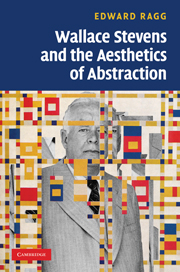Book contents
- Frontmatter
- Contents
- Acknowledgements
- List of Abbreviations
- Introduction: ‘Stevensian’ and the question of abstraction 1935–2009
- 1 The abstract impulse: from anecdote to ‘new romantic’ in Harmonium (1923) and Ideas of Order (1935)
- 2 The turn to abstraction: Owl's Clover (1936) and the ‘un-locatable’ speaker in The Man with the Blue Guitar (1937)
- 3 The ‘in-visible’ abstract: Stevens' idealism from Coleridge to Merleau-Ponty
- 4 Abstract figures: the curious case of the idealist ‘I’
- 5 Abstract appetites: food, wine and the idealist ‘I’
- 6 The pure good of theory: a new abstract emphasis
- 7 Bourgeois abstraction: poetry, painting and the idea of mastery in late Stevens
- Bibliography
- Index
- References
3 - The ‘in-visible’ abstract: Stevens' idealism from Coleridge to Merleau-Ponty
Published online by Cambridge University Press: 04 August 2010
- Frontmatter
- Contents
- Acknowledgements
- List of Abbreviations
- Introduction: ‘Stevensian’ and the question of abstraction 1935–2009
- 1 The abstract impulse: from anecdote to ‘new romantic’ in Harmonium (1923) and Ideas of Order (1935)
- 2 The turn to abstraction: Owl's Clover (1936) and the ‘un-locatable’ speaker in The Man with the Blue Guitar (1937)
- 3 The ‘in-visible’ abstract: Stevens' idealism from Coleridge to Merleau-Ponty
- 4 Abstract figures: the curious case of the idealist ‘I’
- 5 Abstract appetites: food, wine and the idealist ‘I’
- 6 The pure good of theory: a new abstract emphasis
- 7 Bourgeois abstraction: poetry, painting and the idea of mastery in late Stevens
- Bibliography
- Index
- References
Summary
ROMANTIC ADAPTATIONS: WORDSWORTH, COLERIDGE, STEVENS
I still have had
Thy after-sojourn in the self-same place
Present before my eyes, have played with times
(I speak of private business of the thought)
And accidents as children do with cards,
Or as a man, who, when his house is built,
A frame locked up in wood and stone, doth still
In impotence of mind by his fireside
Rebuild it to his liking. I have thought
Of thee, thy learning, gorgeous eloquence,
And all the strength and plumage of thy youth,
Thy subtle speculations, toils abstruse
Among the schoolmen, and Platonic forms
Of wild ideal pageantry, shaped out
From things well-matched, or ill, and words for things –
The self-created sustenance of a mind
Debarred from Nature's living images,
Compelled to be a life unto itself,
And unrelentingly possessed by thirst
Of greatness, love, and beauty.
In The Prelude Wordsworth expresses doubts about Coleridge's idealist imagination. Wordsworth observes his friend has introspected to the extent that the ‘actual world’, as Stevens calls it, no longer influences Coleridge's imagination. Coleridge lives on the ‘self-created sustenance of a mind / Debarred from Nature's living images, / Compelled to be a life unto itself’. But in charging Coleridge with relinquishing his talent to ‘Platonic forms of wild ideal pageantry’ Wordsworth checks his own tendency toward conceiving Coleridge's life in the abstract.
- Type
- Chapter
- Information
- Wallace Stevens and the Aesthetics of Abstraction , pp. 78 - 109Publisher: Cambridge University PressPrint publication year: 2010



